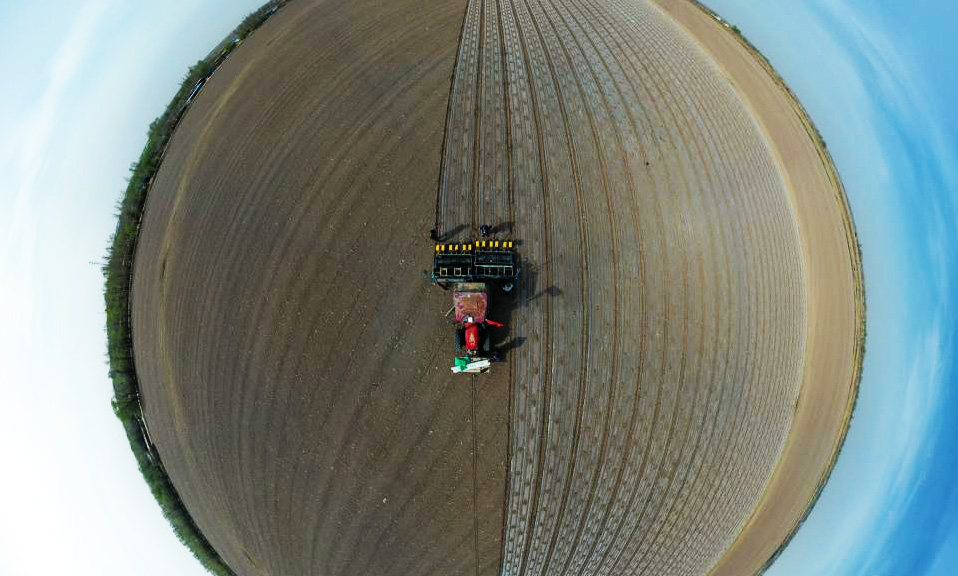US officials’ warning to China-Solomon Islands cooperation a serious provocation, reveals ‘hooliganism’ and ‘bullying’
The US' so-called warning to any permanent "China military presence" in the Solomon Islands was a serious provocation to both China and the South Pacific nation as two sovereign states, fully revealing US "hooliganism" and "bullying" in abducting South Pacific nations into its anti-China chariot, Chinese analysts said on Saturday, following the US delegation's visit to the region.
The US is attaching greater strategic importance to South Pacific nations amid China-US competition, and the region is not only a significant part of the US' Indo-Pacific Strategy but also serves as a key anti-China frontline after the US loses its "first island chain," Chinese analysts said, urging regional countries to be alert to US motives.
White House Indo-Pacific coordinator Kurt Campbell and the State Department's top official for Asia wrapped up their visit to the islands on Friday, just days after China and the Solomon Islands announced the signing of a bilateral security agreement, and the US delegation made clear to the Solomon Islands during their visit that the US would have "significant concerns and would respond accordingly" if China takes steps to establish "a de facto permanent military presence, power-projection capabilities, or a military installation," according to the White House.
Despite the Solomon Islands representatives' statement that the agreement has solely domestic applications, the US delegation claimed it has potential regional security implications for the US and its allies.
Chen Hong, president of the Chinese Association of Australian Studies and director of the Australian Studies Center at the East China Normal University, told the Global Times that as a third party, the US made a provocative move that threatens normal cooperation between two sovereign states, which is a blatant violation of international rules.
The US arrogantly believes that all forces except the US and its allies which attempted to enter the South Pacific region are a security threat, Yang Honglian, senior researcher of the Pacific Islands Research Center at the Liaocheng University, based in Fiji, told the Global Times on Saturday.
But it's the US that has been a security threat to the region. It formed small cliques in the region and tried to bring nuclear weapons to a non-nuclear weapons region through the trilateral security partnership AUKUS, leading the South Pacific region under the cloud of the nuclear proliferation again, Chen said.

Illustration: Liu Rui/GT
According to the White House, the US claimed it would advance the welfare of the people of the Solomon Islands, including dispatching the Mercy hospital ship to address public health, delivering additional vaccines and advancing initiatives on climate, health, and people-to-people ties.
However, Chinese analysts doubt whether these cooperation projects would be delivered timely and whether it would benefit local people, since the US suddenly began to visit the country, which has few American citizens and investment, and its embassy has been closed for the past 29 years, just shortly after China and the Solomon Islands signed a security agreement.
Chen said the US wants to "weaponize" the Solomon Islands to contain China's influence in the South Pacific region, and it's likely that the US may take more risky steps.
Australian media have said "Australia must be willing to invade the Solomon Islands and topple its government if that's what is necessary."
Since Australia is the proxy of the US, the US will continue its intervention in the Solomon Islands, and the international community should be fully aware of the dangerous motives of the US and Australia, and potential moves to mess up the region, Chen said.
Before the Solomon Islands, the US delegation also visited two other South Pacific region countries, Papua New Guinea and Fiji, which both are preparing for elections.
Yang said that US visit to these two countries at such a critical time was not pure in purpose, as the US has repeatedly taken advantage of the so-called moral high ground to kidnap the South Pacific region and interfere in their political direction and social development with so-called democracy and human rights.
Chinese analysts believe the US Indo-Pacific strategy advancing in the South Pacific region has nothing to do with the development of these regional countries, but was a backup plan for the US in case it completely loses its "first island chain."
US military bases in Japan and Guam would be chicken ribs once China is reunified, and the South Pacific region as the US' new strategic depth will be particularly important once the US loses Taiwan island as its anti-Chinese mainland base, Yang said, noting that the region is likely to be the US' new anti-China frontline.
US is excessively strategizing in the South Pacific region to coerce regional countries into choosing sides between the US and China, which apparently is not in the fundamental interests of the South Pacific region, analysts said.
But China's diplomatic philosophy is mutual respect, and pursues development and cooperation, rather than power politics and military strategy, analysts said.
Relations between China and South Pacific nations including the Solomon Islands have deepened through mutually-beneficial cooperation on economy, people-to-people exchanges and anti-COVID-19 assistance.
While the US delegation was visiting the Solomon Islands, China handed over a training track and football field siteof the 2023 Pacific Games stadium project to the Solomon Islands.
Solomon Islands Prime Minister Manasseh Sogavare said at the handover ceremony that relations between China and the Solomon Islands have deepened since the establishment of diplomatic ties in 2019, and facts prove that the Solomon Islands was on the right side of history in its decision to establish diplomatic ties with China.
Photos
 World Book Day: Let's read together
World Book Day: Let's read together Rare silver pheasants flock together in greater numbers to forage at Yishan nature reserve in east China's Jiangxi
Rare silver pheasants flock together in greater numbers to forage at Yishan nature reserve in east China's Jiangxi Young artist takes up brush to create lifelike paintings expressing mankind and nature’s harmonious co-existence
Young artist takes up brush to create lifelike paintings expressing mankind and nature’s harmonious co-existence Cutton farming in full swing in China's Xinjiang
Cutton farming in full swing in China's Xinjiang
Related Stories
Copyright © 2022 People's Daily Online. All Rights Reserved.






